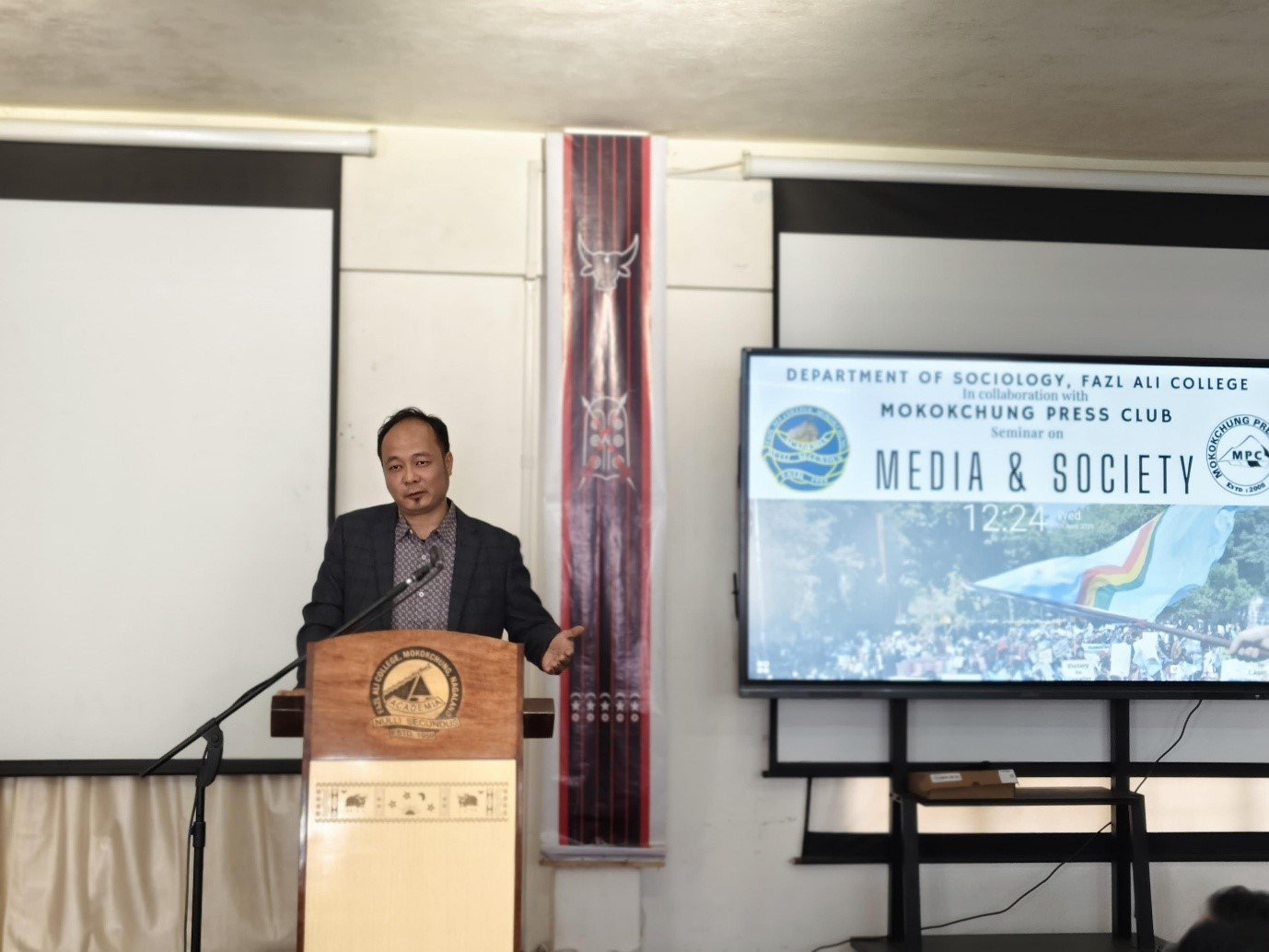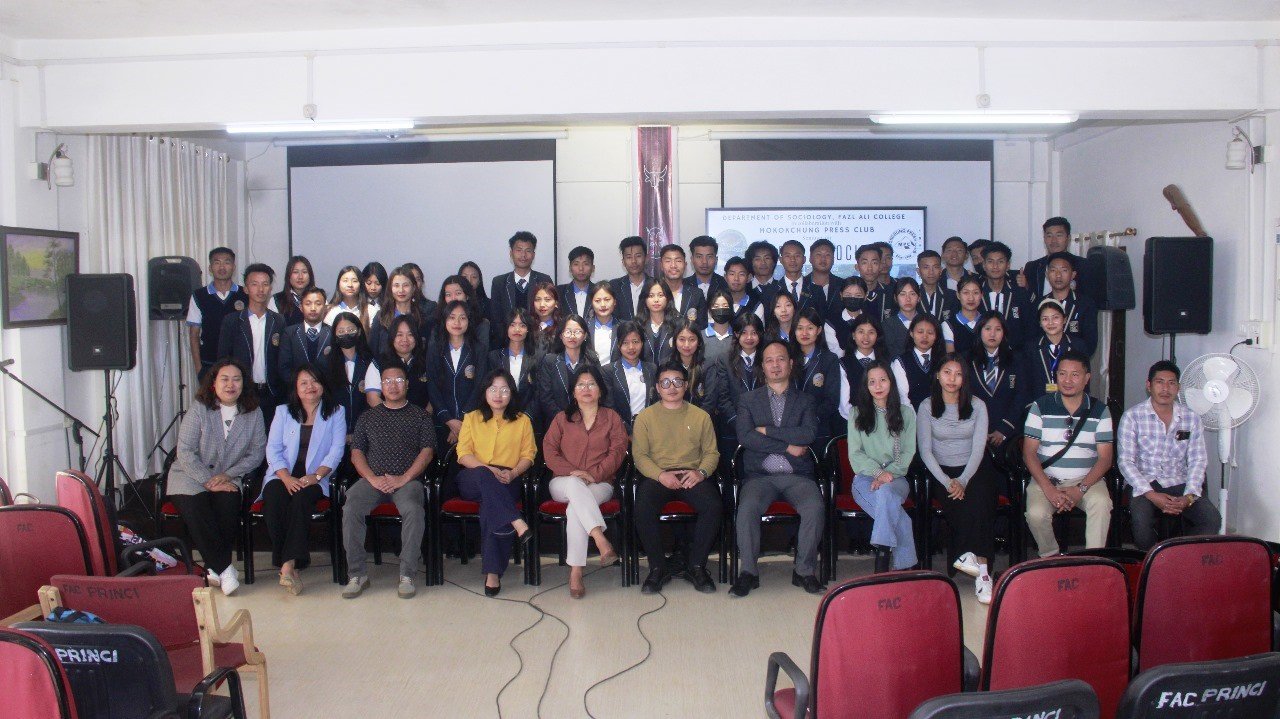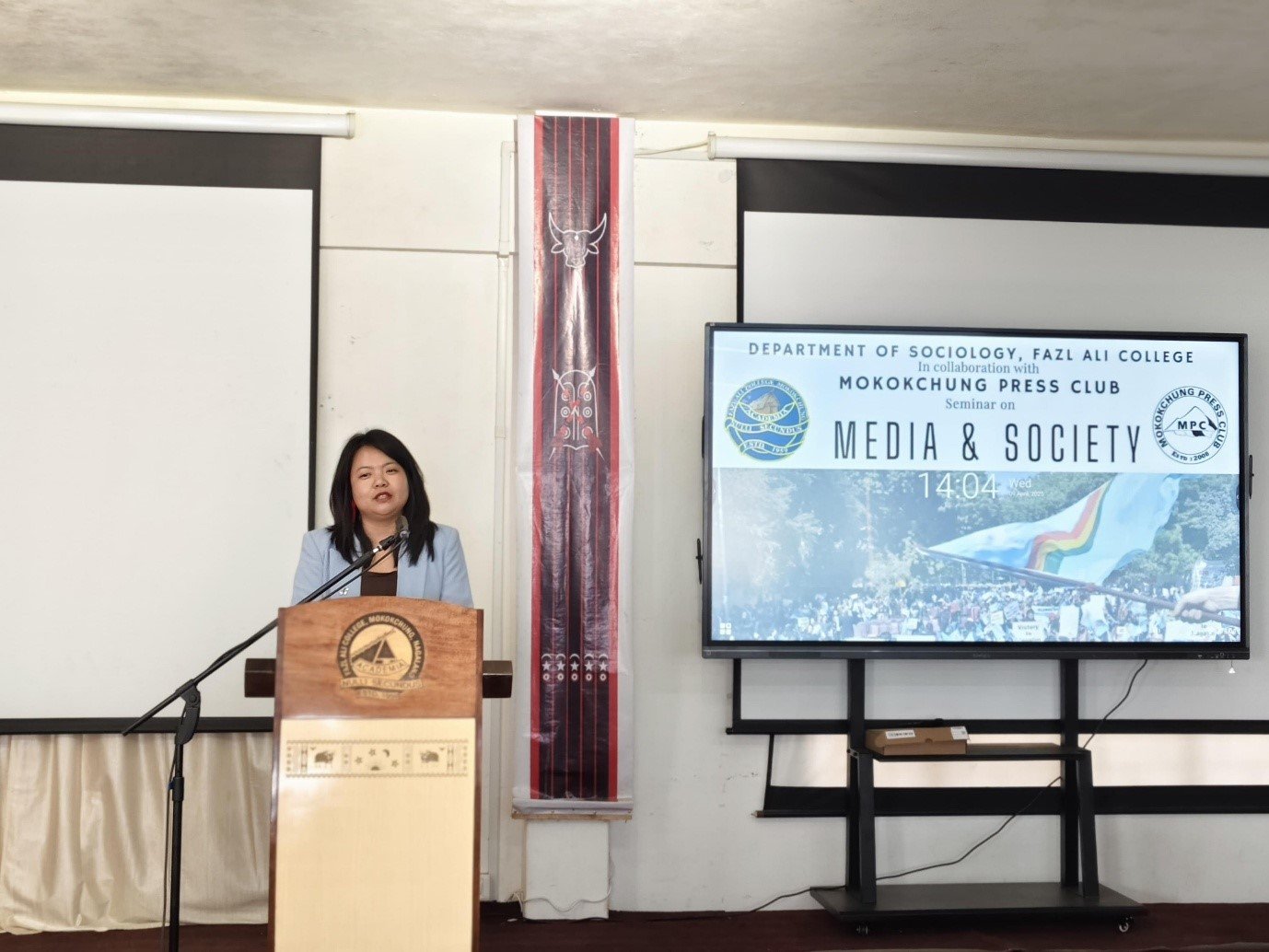The Department of Sociology, Fazl Ali College, in collaboration with Mokokchung Press Club (MPC), organized a seminar on the theme ‘Media and Society’ on April 9 at the college’s conference hall.
Chaired by Humsen, a sixth-semester BA student, the programme began with a welcome address by Dr. Adangla Changkija, HOD, Department of Sociology, followed by a short speech from the Principal, Dr. I. Wati Imchen.
Delivering the keynote address on ‘Media and its Impact on Community Dynamics’, Limalenden Longkumer, President of MPC and Editor of Mokokchung Times, emphasized that media is not only a mirror of society but also a powerful agent of change. “Whatever we know today—whether it’s geopolitics, global conflicts, or social movements—it’s all because of media,” he said. He reminded students that media shapes ideology, language, behavior, and culture. “The media is a reflection of society,” he added.
He stressed that students must think critically and become active participants in shaping society. “Change begins when we ask the right questions,” he said, urging students to challenge perspectives and assumptions, raise questions, speak up, and use media to voice their thoughts and drive change. “You are not just consumers of media; you are creators of media narratives,” he remarked.

Reflecting on the academic outlook in society, Longkumer observed how subjects like Sociology and Education are often seen as easy, while disciplines such as History and Political Science are perceived as difficult. Longkumer observed how subjects like Sociology and Education are often seen as easy, while disciplines such as History and Political Science are perceived as difficult. Emphasizing the analytical nature of Sociology, he pointed out that the subject studies patterns, behaviors, and structures within society through research and empirical methods—making a strong case for why Sociology rightly deserves a place within the science stream. “Sociology is not just about theory—it’s about observing, analysing, and understanding social realities using scientific approaches,” he added.
Drawing from his personal journey, he reflected on generational shifts and shared that when he was a student nearly 30 years ago, gender representation in classrooms was different. “One drastic change I noticed is that girls now far outnumber boys in colleges. What does this imply? Girls, you need to wonder—what is your role in this changing society?” he said.
Asserting the relevance of sociology, he said, “As students of sociology, you have to research, study, and understand society. We are living in a society of paradoxes, where decisions are often based on emotions, and where problems are terminated or suppressed instead of being solved.” Quoting the theory of positivism, he underlined the tendency to act emotionally rather than rationally and called upon students to understand the implications of such behaviors on the social structure.
Download Nagaland Tribune app on Google Play

Speaking about MPC, Longkumer noted that although the club was established in 2008, this was the first time its members were officially invited to such a platform. He acknowledged the preconceived notions about the media and admitted that while media professionals have their shortcomings, they are doing their best under the circumstances. “Despite our flaws, we stand with the rest of the media fraternity across Nagaland,” he added.
On the role of the media, he said, “Media shapes society and the world at large. Whatever we know about global issues, geopolitics, and beyond—it comes through the media.” He elaborated that media in all its forms influences our language, behavior, and worldview, and that global media in particular has made people more aware of pressing international issues. “Even in Indian politics, it is through the media that we learn, form opinions, and analyse. The way we perceive the world is based on ideology—and media plays a big role in shaping that.”

He also pointed out that “The misuse of customary laws is very evident—these are our realities. It is the local media that brings such issues to light.” Reminding the students of their agency, he reiterated that media gives people the power to shape not just communities but the world.
He elaborated on the evolution of journalism in the digital age. “While digital media has drastically changed the way we work and made things more convenient, the values of journalism remain unchanged,” he said.
Touching on challenges, he revealed the threats faced while reporting controversial issues in a close-knit society like Nagaland. “Sometimes we receive threats in the form of friendly requests, sometimes even summon letters. The biggest threat is when issues become personal—villageism is the worst disease,” he remarked.
On a hopeful note, Longkumer encouraged students who aspire to join media. “If you want to bring change to society, journalism is the right path—but only if you are true to your calling. From a monetary point of view, this profession may not attract you. But if your goal is impact, then welcome to the field.”
Addressing the students of sociology directly, he reminded them of their responsibility: “As students of sociology, we must research, study, and understand the society we live In.” He encouraged them to examine how misinformation and disinformation are affecting society and called on them to be wise and responsible in their actions.

During the interactive session, Longkumer posed five stimulating and thought-provoking questions to the students, encouraging them to reflect deeply and seek answers through research, dialogue, and writing. He urged them to consider publishing their findings in newspapers or on personal platforms:
Why does our society still uphold superstitious beliefs?
Why does our society fail to punish corruption and reward integrity?
What must we do to overcome tribalism and village-ism?
Does religion have any social value? If yes, why does society not practice the teachings it professes?
Why are scientific inquiry, critical thinking, and social awareness lacking in Naga society?
“These are the kind of questions that demand answers from thoughtful minds like yours,” he said, adding that students must become active participants in shaping a more aware and responsible society.
The seminar concluded with a vote of thanks by Dr. Limasenla Jamir, Assistant Professor, Department of Sociology.

